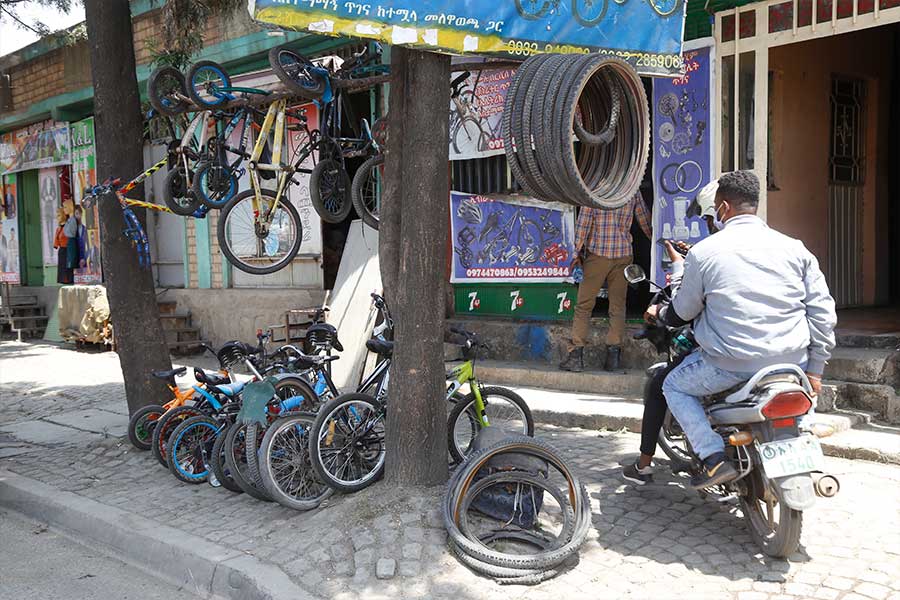
Viewpoints | Sep 28,2024
May 9 , 2020
By Halima Abate (MD) ( Halima Abate (MD) is a public health professional with over a decade of experience. She can be reached at halimabate@gmail.com. )
Life is full of uncertainties. Humankind faces droves of natural and humanmade disasters, urging the need for strong public health preparedness for effective intervention. In the realm of public health, disasters are considered ecological disruptions that result in deaths, injuries, illness or damage that cannot be effectively managed by the application of routine procedures or resources.
Besides, they could be emergencies (any occurrence that requires an immediate response); hazards (caused by a natural phenomenon); incidents (a natural or human-made event requesting a response to protect life or property); or natural disasters (a rapid, sudden phenomenon with profound effects). Thus, action should be taken in a multi-pronged approach where jurisdictions, agencies and authorities might be involved to prevent injury, illness or death.
Globally, there has been a recognition of the peril of biological and chemical threats as well as epidemics. Accordingly, in response to these concerns, countries should exert their efforts to bolster public health preparedness to ensure public safety. An array of preparedness plans to minimise morbidity and mortality are crucial and require securing funding, mechanisms for surge capacity, including ongoing assessments of needs, identification of alternate triage and treatment sites, workforce training and psychosocial support of the public.
How close we live to biological threats is now obvious in the era of the Novel Coronavirus (COVID-19) pandemic. In Ethiopia, the government has taken disaster relief measures. They have been tied to a multitude of activities in leadership, communication and managing information, planning for and improving practices, protecting worker health and safety to minimise social disruption and economic losses.
Public health preparedness has been necessitated because of the devastating consequences of healthcare systems becoming paralysed. Accordingly, the Office of the Prime Minister along with sector offices were responsible for sketching the strategy, while the Health Ministry has been responsible for implementing the action plan, coordinating across the government as needed, and reporting to the Prime Minister. The planning and finance ministries have been accountable for overseeing budget allocations and working with the Health Ministry to direct funds to priority areas.
Given the limits on the government’s resources, it was essential to use public finances in a way that delivered the greatest impact possible - and that was a difficult prospect. Hence, landmark calls for collaboration, coordination and cooperation – the three Cs – among the regional and federal governments. Communication strategies for risk-reduction behaviours, including social distancing, hand washing and “respiratory etiquette,” were noticeably carried out uniformly with a single voice. This pandemic has also opened the eyes of each sector to the need for personal protective equipment, medical supplies and pharmaceutical supplies.
Perhaps the silver lining of this pandemic is how it has awakened the country to the interconnected and broad nature of the emergency response and inculcated the spirit of citizenship.
The Novel Coronavirus (COVID-19) pandemic has served as a conduit to many lessons that should be learned and ideas that should be garnered for future policy discussions.
Reflecting on the government’s responses to this pandemic will be necessary to understand how to respond to future biological and chemical threats and challenges.
One of the first improvements that should be expanded is how the federal government has prioritised a whole-of-government approach, bringing together all levels of the federal, regional, and local governments, as well as various sectors and government departments, into coordination.
Another important lesson has been how the administration’s primary goal was to ensure the well-being of citizens, working in tandem with state and local public health officials in their effort to address the pandemic. This has encompassed the provision of health guidance based on factual information, the elimination of state bureaucratic red tape that was preventing strategic leadership and restricting public health resources.
Restrictions of activities were carefully managed as well at the appropriate level with decisions based on the current and anticipated situation, while there was a fair balance between preserving both life and liberty to avoid worsening the “costs of the cure."
The efforts exerted by our government have given us a sense of direction and leadership and has re-ignited a renewed sense of community among the populace. People have taken on a sense of duty, which is essential for the nurturing of egalitarian character, cultivating authentic social well-being and developing the trait of thoughtful decision making.
PUBLISHED ON
May 09,2020 [ VOL
21 , NO
1045]

Viewpoints | Sep 28,2024

Radar | May 07,2022

Fineline | Jul 20,2019

Radar | Mar 27,2021

Viewpoints | Jan 09,2021

Editorial | Sep 26,2021

Commentaries | Mar 28,2020

Commentaries | Mar 21,2020

Viewpoints | Aug 20,2022

Sunday with Eden | Feb 16,2019

Dec 22 , 2024 . By TIZITA SHEWAFERAW
Charged with transforming colossal state-owned enterprises into modern and competitiv...

Aug 18 , 2024 . By AKSAH ITALO
Although predictable Yonas Zerihun's job in the ride-hailing service is not immune to...

Jul 28 , 2024 . By TIZITA SHEWAFERAW
Unhabitual, perhaps too many, Samuel Gebreyohannes, 38, used to occasionally enjoy a couple of beers at breakfast. However, he recently swit...

Jul 13 , 2024 . By AKSAH ITALO
Investors who rely on tractors, trucks, and field vehicles for commuting, transporting commodities, and f...

Oct 18 , 2025
The political establishment, notably the ruling party and its top brass, has become p...

Oct 11 , 2025
Ladislas Farago, a roving Associated Press (AP) correspondent, arrived in Ethiopia in...

Oct 4 , 2025
Eyob Tekalegn (PhD) had been in the Governor's chair for only weeks when, on Septembe...

Sep 27 , 2025
Four years into an experiment with “shock therapy” in education, the national moo...